Review of the research progress of iNKT cell treatment of liver cancer and other cancers!
It can increase the cure rate of liver cancer by N times!
With the continuous advancement of medical technology, the treatment methods for primary liver cancer are changing with each passing day. There are not only local treatment methods such as surgical resection/transplantation, ablation therapy, radiotherapy, chemotherapy, TACE/HAIC, but also targeted therapy, immunotherapy, traditional Chinese medicine treatment, and other systemic treatment methods. However, despite this, the overall long-term survival and cure effect of cancer patients in my country are still not ideal, especially for liver cancer.
The National Cancer Report released by the National Cancer Center in 2024 shows the following figure. The 5-year survival rate of liver cancer patients in China has only increased from 10.1% in 2003-2005 to 12.1% in 2012-2015. It has only increased by 2% in more than ten years. The reason is that the treatment of primary liver cancer will face many problems, such as recurrence after treatment, metastasis inside and outside the liver, and multiple complications after multiple treatments, such as obstructive jaundice, liver failure, infection, etc. Therefore, in order to improve the 5-year survival rate of liver cancer patients in my country, new treatment methods and measures are urgently needed.
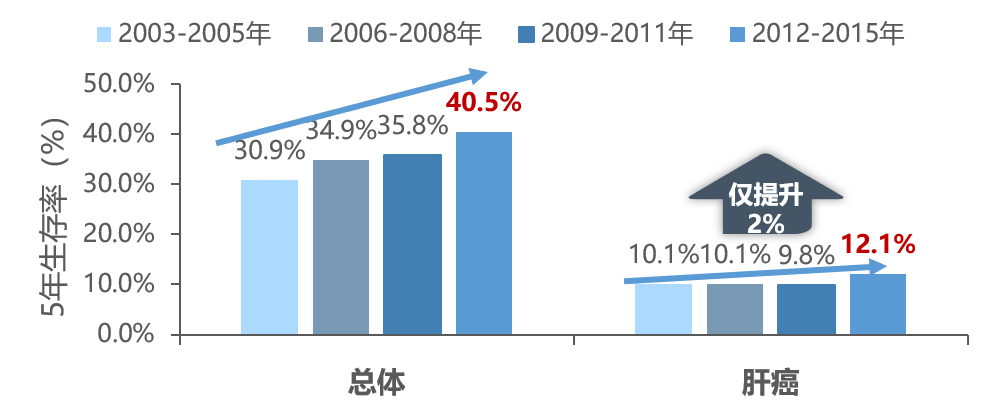
In recent years, Chinese medical researchers are actively exploring the anti-tumor potential of iNKT cell immunotherapy and have made good progress.
一 iNKT cells have strong anti-tumor killing ability
iNKT cells are constant natural killer T cells, which are tissue homing and tissue resident cells that develop in the thymus and gather in the liver. They are also distributed in other parts such as the spleen, bone marrow, lymph nodes, skin mucosa and peripheral blood, forming a local immune environment. iNKT cells are the fourth type of lymphocytes after T cells, B cells and NK cells.
iNKT cells have the characteristics of T cells and NK cells, can recognize glycolipid antigens presented by non-polymorphic MHC class molecules CD1, and play a powerful anti-tumor and immunomodulatory role through innate and adaptive immune responses.
iNKT cells kill tumor cells mainly through the following four pathways:
1. Interacting with DC cells, it can promote the maturation and antigen presentation function of DC, leading to self-activation. Activated iNKT cells will release cell death-inducing molecules such as perforin, interferon, and granzyme on the surface of tumor cells. These molecules can directly act on tumor cells, leading to apoptosis or necrosis of tumor cells.
2. Auxiliary effect Activated iNKT cells release a substance called IFN-ɤ (interferon γ), which causes various immune cells to proliferate successively. It activates killer T cells, NK cells, and macrophages and proliferates them to fight cancer.
3. iNKT cells have unique activation mechanisms and immune recognition capabilities. They can recognize and bind to specific glycolipid antigens, and then regulate and activate other immune cells including B cells, promote antibody production and enhance immune response.
4. Checkpoint inhibition. Activated NKT cells kill the immunosuppressive cells prepared by cancer cells, relieve various immunosuppression, and greatly improve the immune status in cancer tissues.
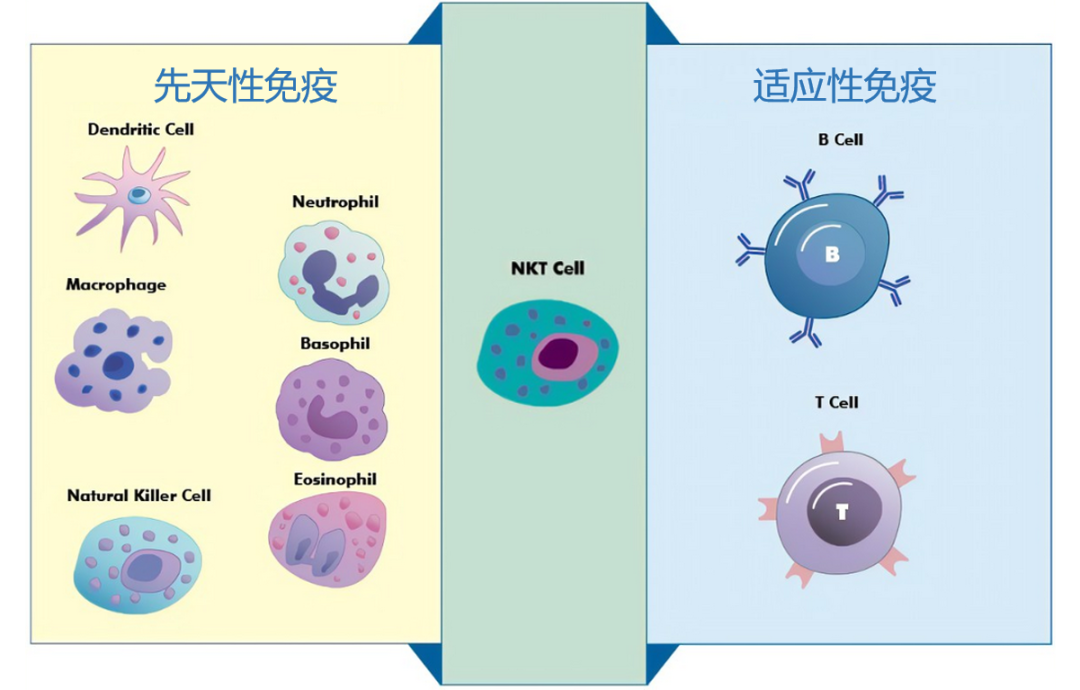
In summary, iNKT cells play an anti-tumor role through multiple mechanisms such as directly killing tumor cells, activating and regulating other immune cells, and recognizing tumor-associated antigens. These mechanisms work together, interweave, and together constitute the important position of iNKT cells in anti-tumor immunity. Improve the treatment effect and quality of life of tumor patients and prolong their life cycle.
II iNKT cell immunotherapy is expected to bring breakthrough treatment options to liver cancer patients
Many studies have shown that iNKT cell therapy has shown broad prospects for safety and effectiveness in the treatment of cancer, especially liver cancer.
1. Phase I clinical trial shows that autologous iNKT cells are safe and well tolerated in clinical application
In order to explore the safety and efficacy of autologous iNKT cell therapy in patients with advanced hepatocellular carcinoma, an open-label, continuous dose escalation phase I clinical trial was conducted.
The results showed that autologous iNKT cells are safe and well tolerated for patients with hepatocellular carcinoma. No serious adverse events were observed in all enrolled patients.
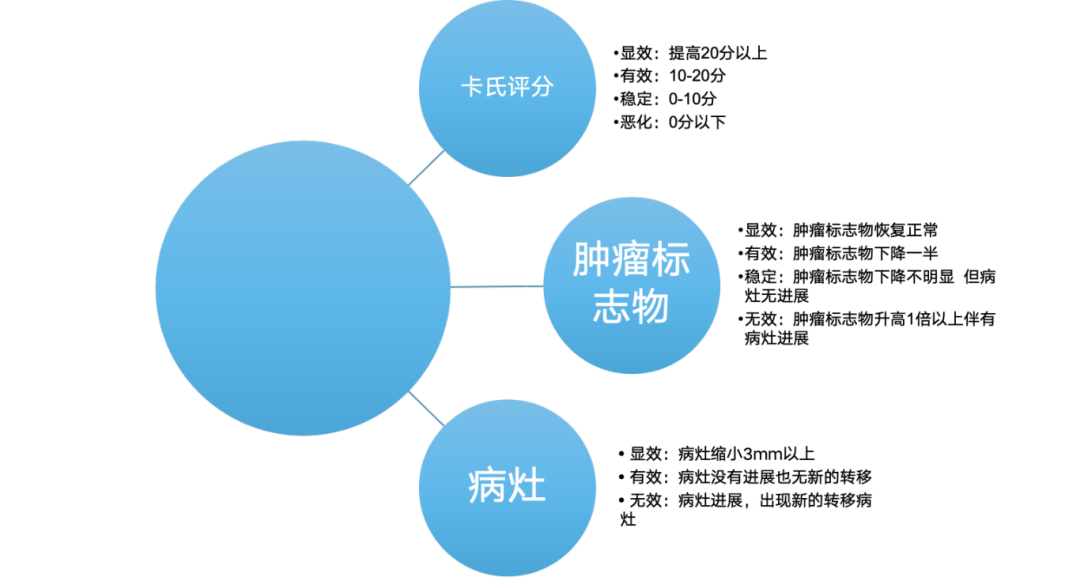
From the perspective of efficacy, iNKT cells have a positive effect on prolonging the survival of patients. Under normal circumstances, the survival of patients with advanced liver cancer does not exceed 6 months, but after autologous iNKT cell treatment, 7 patients survived for more than 6-7 months, which is an amazing effect.
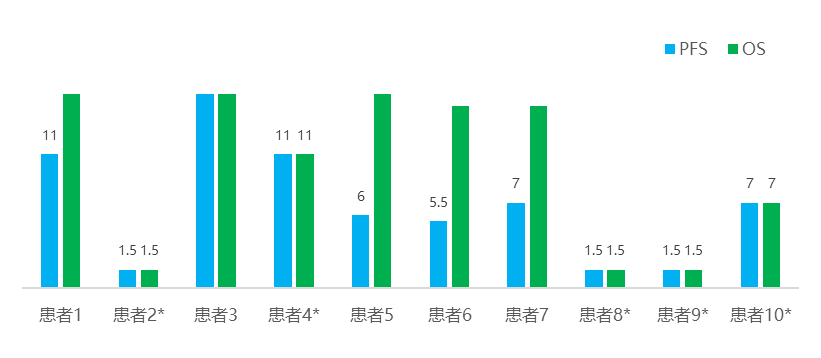
Clinical data show that iNKT cells have super strong killing power and targeting against tumor cells.
2. Phase II clinical trial shows that iNKT cell therapy increases the cure rate of cancer patients by 5 times
Researchers conducted a phase II clinical trial to explore the efficacy of autologous iNKT cell therapy in patients with advanced hepatocellular carcinoma who failed TACE treatment.
This clinical trial included 54 patients, all of whom were patients who failed TACE treatment or were diagnosed with refractory hepatocellular carcinoma, and were staged as BCLC B/C. The researchers randomly divided them into the TAE group and the TAE-iNKT group.
Clinical results showed that 5 patients achieved complete remission.
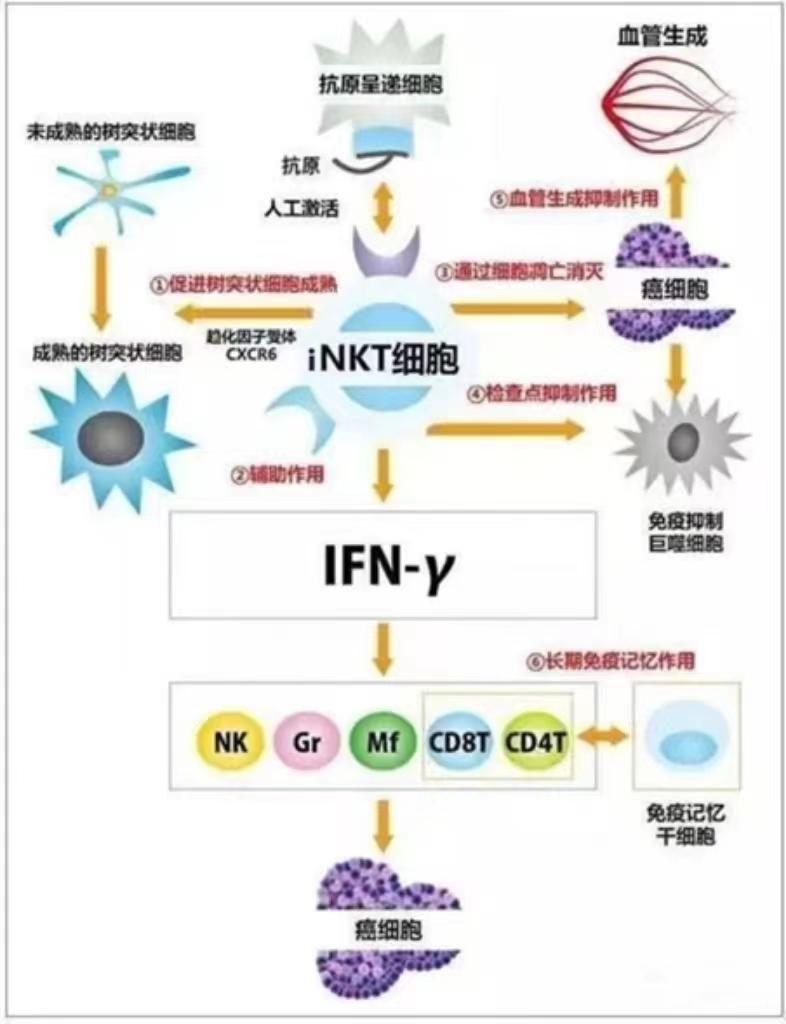
In terms of safety, although all subjects experienced adverse reactions to varying degrees, the incidence of fatigue, fever, elevated alanine aminotransferase, and elevated blood bilirubin in the TAE-iNKT group was relatively low compared with the control group.
In addition, the combined treatment of TAE and iNKT cells has good safety and controllable toxic side effects.
Combined with the above conclusions, this study shows that compared with TAE alone, iNKT cell infusion plus TAE can improve the patient's survival cycle, help control the development of the disease, improve the patient's quality of life, and autologous INKT has relatively low toxicity.
Summary of INKT
iNKT cells are constant natural killer T cells that can play a powerful anti-tumor and immunomodulatory role by bridging innate and adaptive immune responses, and can mature immature dendritic cells, with significant efficacy in HCC patients.
The quality of life of patients who received iNKT cells was significantly improved compared with those who did not receive them.
With the development of clinical research on various immune cells with modern technology, it will bring a paradigm shift in cancer treatment. Autologous INKT immune cells are suitable for mid-term or earlier treatment based on their own outstanding safety, and have the opportunity to improve the quality of life and prolong the life cycle of cancer patients.






